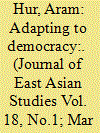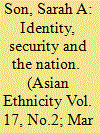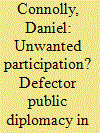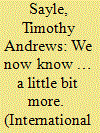| Srl | Item |
| 1 |
ID:
158540


|
|
|
|
|
| Summary/Abstract |
Defection from North Korea to South Korea has increased dramatically, but little is known of its political consequences. Do North Korean defectors successfully adopt democratic norms, and if so, what factors aid this process? Through a novel survey of defectors, I find that national identification plays a significant role in motivating their fledgling sense of democratic obligation. Greater feelings of national unity with South Koreans lead to a stronger duty to vote and otherwise contribute to the democratic state. This effect is more powerful than that of conventional contractual factors, on which most state resettlement policies are based, and is surprising given that defectors’ nationalist socialization mostly took place under the authoritarian North. The findings suggest the need to reconsider integration approaches toward North Korean defectors and similarly placed refugees elsewhere.
|
|
|
|
|
|
|
|
|
|
|
|
|
|
|
|
| 2 |
ID:
147860


|
|
|
|
|
| Summary/Abstract |
From the Cold War era of the ‘veteran heroes’ to the present view of escaped North Koreans in terms more akin to ‘refugees’ and sometimes even just ‘migrants’, perceptions of North Korean defectors in South Korea have changed as swiftly as the number and origins of Northerners entering the South have expanded. At the same time, government policy for these ethnic ‘brethren’ has evolved considerably, particularly as South Korea has seen fundamental shifts in its independent identity, with important repercussions for the way its citizens view themselves as a collective. This article explores some of the key influences behind changes to policy and perceptions regarding North Korean people in South Korea over the period from 1997 to 2012, by applying international relations theory on national identity and its role in policy formation and change through the need to secure different parameters within that identity.
|
|
|
|
|
|
|
|
|
|
|
|
|
|
|
|
| 3 |
ID:
186609


|
|
|
|
|
| Summary/Abstract |
The controversy surrounding defector balloon launches into North Korea is often viewed as a bizarre example of Cold War legacies on the Korean peninsula. However, it is also a unique case study of non-state public diplomacy because these groups are attempting to engage in cross-border communication against the wishes of their host government. This article argues that South Korea’s unique interpretation of public diplomacy as a participatory activity has proven vulnerable to non-state organisations with divergent views of the national interest, which has resulted in two different types of public diplomacy being directed at North Korea. Subsequent attempts by the South Korean government to control the dissonant public diplomacy of non-state groups resulted in reputational costs for both sides and ultimately failed to prevent defectors from advancing their claim to a human right to communicate across national borders. Even though this case study broadly supports a polylateral interpretation of public diplomacy, it cautions that human rights discourses may obscure the fact that the traditional diplomatic system was designed to mitigate many of the risks associated with non-state diplomatic actors. Therefore, this paper suggests the need for more discussion about the consequences of a right to communicate across national borders.
|
|
|
|
|
|
|
|
|
|
|
|
|
|
|
|
| 4 |
ID:
179859


|
|
|
|
|
| Summary/Abstract |
Igor Gouzenko’s defection might have been the first—and most famous—of the Cold War in Canada, but it was hardly the last. Recently opened after Access to Information Act requests made by the Canadian Foreign Intelligence History Project, a number of records cast brighter light on this aspect of Canada’s intelligence history. This article offers an overview of how the Government of Canada established its policy to manage defection and those who defected. It offers a number of possible leads for future research projects, some, but not all, of which, will require the release of further material, whether under the Access to Information Act or a broader declassification framework from the Government of Canada.
|
|
|
|
|
|
|
|
|
|
|
|
|
|
|
|